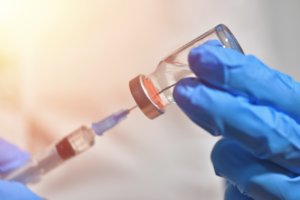
A 43-year old woman with two children has become the first study participant in a phase 1 clinical trial for an experimental vaccine against the spreading coronavirus. She was administered the vaccine, mRNA-1273, on March 16th. This move marks the official start to the open-label trial and what researchers hope will lead to the first approved vaccine for COVID-19.
The trial, which is taking place in Seattle at Kaiser Permanente Washington Health, will include 45 adult volunteer participants ranging in age from 18 to 55, who will each receive the vaccine on two separate occasions, 28 days apart. The vaccine will be administered through an injection in the upper arm.
Equal numbers of participants will receive one of three dosing regimens of the investigational vaccine: 25 micrograms, 100 micrograms, or 250 micrograms at each administration. Low doses will be administered first so that safety data can be obtained before higher doses are provided. Safety data will also be used to evaluate the appropriateness of administering a second dose to each participant. In addition to being monitored for common symptoms associated with vaccinations during the one-year follow-up period, participants will also be tested for their immune response to the vaccine through blood samples.
The development of this new vaccine was inspired by insights from previous studies focused on other coronaviruses, including those that can cause Middle East respiratory syndrome (MERS) and severe acute respiratory syndrome (SARS). Specifically, this vaccine contains a genetic code copied from SARS-CoV-2, the virus that causes COVID-19, and leverages messenger RNA (mRNA) to guide the cells of the body to express virus protein so that an immune response is initiated. Unlike typical vaccines, mRNA-1273 is not made from the virus that causes disease.
The initiation of this clinical trial has occurred in record time following a critical collaboration between Moderna Therapeutics – a biotechnology company based in Cambridge, Massachusetts – and the National Institute of Allergy and Infectious Diseases (NIAID). According to researchers, despite the fast-track nature of the research and development, it will still be several months before it is clear if the vaccine works. If all goes well, it will likely be closer to 18 months before the vaccine is available to the hospital physicians and other providers.
